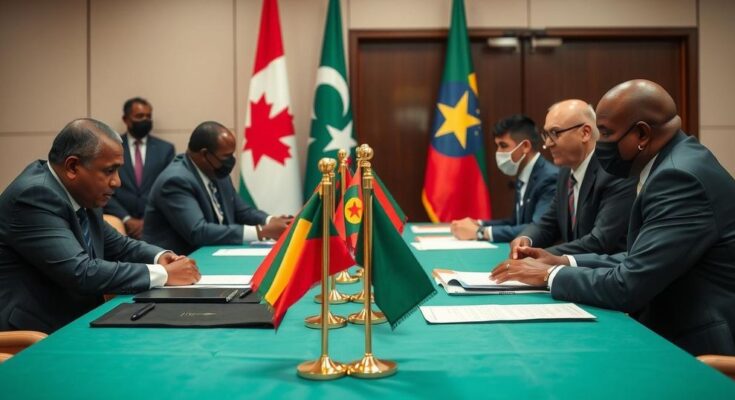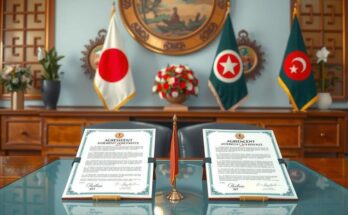Somalia’s President Hassan Sheikh Mohamud will visit Ethiopia amid efforts to strengthen relations following a recent peace deal. The visit is influenced by Ethiopia’s controversial pact with Somaliland. Despite this diplomatic progress, significant challenges, including Ethiopia’s access to the sea and regional tensions, persist as highlighted by the meeting of Somali, Egyptian, and Eritrean foreign ministers.
On Saturday, the President of Somalia, Hassan Sheikh Mohamud, will undertake a visit to Ethiopia, as per an official statement from his office. This visit is part of a concerted effort by both nations to strengthen relations following a peace agreement established last month, which aims to alleviate tensions within the volatile Horn of Africa. Notably, Ethiopia’s need for maritime access has historically complicated its relations with neighboring countries, particularly Somalia.
The backdrop of this visit includes a controversial agreement signed by Ethiopia with the self-declared independent region of Somaliland a year prior, which had sparked outrage in Somalia. The agreement was viewed as a direct threat to Somalia’s sovereignty, as it allowed Ethiopia to secure a port and military base on the Red Sea in exchange for recognizing Somaliland’s independence. However, discussions facilitated by Turkey led to a recent reconciliation, resulting in the aforementioned peace accord, emphasizing a renewed spirit of collaboration between the two countries.
In anticipation of the upcoming visit, Somali President Mohamud’s office stated, “This visit builds on the recent agreement reached in Ankara. This renewed cooperation underscores a new era of collaboration between Somalia and Ethiopia.” Despite these diplomatic overtures, substantial challenges remain unresolved, particularly concerning Ethiopia’s aspirations for maritime access and its contentious agreement with Somaliland.
On a related note, Somali Foreign Minister Ahmed Moalim Fiqi recently convened with his Egyptian and Eritrean counterparts in Cairo. This meeting underscored a collective unease regarding Ethiopia’s regional ambitions. Egyptian Foreign Minister Badr Abdelatty stated, “The Red Sea and its security is subject only to the will of the countries on its coast, and it is absolutely unacceptable for any country not bordering the Red Sea to have a presence, whether military, naval or otherwise.”
The evolving dynamics in the region have compelled Egypt, Eritrea, and Somalia to forge closer military collaborations, including the integration of Egyptian forces into the African Union Support and Stabilization Mission in Somalia (AUSSOM), recently established to combat Islamist insurgents. The complexities remain as nations navigate the intricate web of alliances and tensions in the Horn of Africa.
The geopolitical landscape of the Horn of Africa has been marked by historical rivalries and alliances, particularly between Somalia and Ethiopia. Ethiopia, landlocked and seeking access to the sea, has engaged with Somaliland, a breakaway region of Somalia, further complicating the bilateral relationship. The recent peace agreement mediated by Turkey represents a significant diplomatic step, though lingering tensions, especially regarding military presence and territorial integrity, continue to shape interactions among the regional players.
In conclusion, President Hassan Sheikh Mohamud’s impending visit to Ethiopia signifies a pivotal moment in Somali-Ethiopian relations, building upon the recent peace accord aimed at resolving long-standing grievances. Nevertheless, the road ahead is fraught with challenges, particularly regarding unresolved territorial disputes and regional security concerns. The collective stance of Egypt, Eritrea, and Somalia against Ethiopian ambitions within the Red Sea underscores ongoing tensions and the complexities of regional diplomacy in the Horn of Africa.
Original Source: thedefensepost.com




